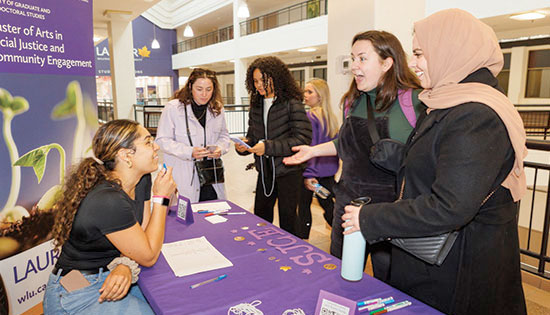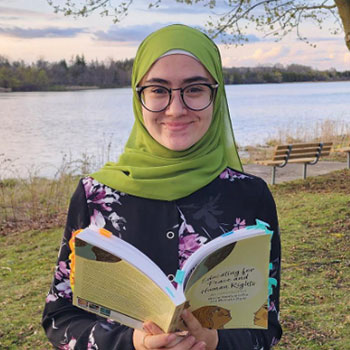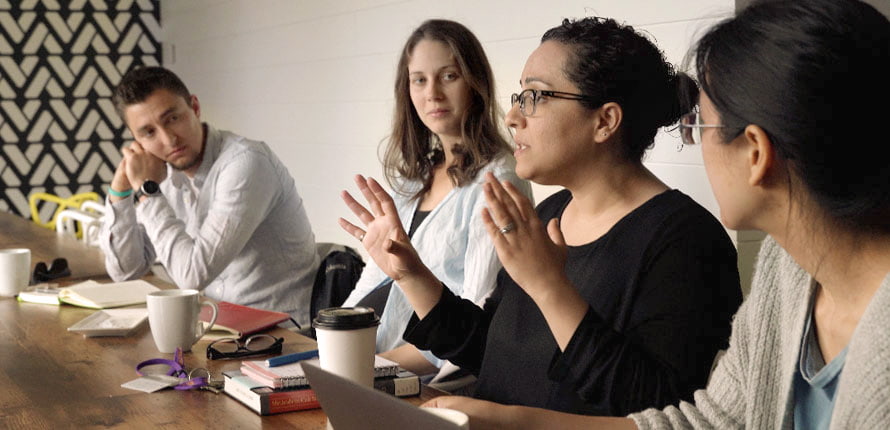Search for academic programs, residence, tours and events and more.
Want to change the world? Our program fosters your ability to investigate and understand the root causes of the most pertinent social justice and environmental issues of our times. Through a combination of critical theory, applied methods, and an extensive community placement our Master of Arts (MA) program in Social Justice and Community Engagement (SJCE) engages students in the active promotion of social and environmental justice principles both locally and globally.

120-hour community placement.
12-month full-time program (part-time available).
Choose coursework, major research project or creative project route.
The Master of Arts (MA) in Social Justice and Community Engagement (SJCE) is offered in person at Laurier’s Brantford campus. The Social Justice and Community Engagement MA offers three options of study: coursework, coursework + major research project, coursework + creative major research project. The coursework option is the default for admission. All students are accepted into to this option and may apply to change to the major research project or creative major research project option after consultation with the graduate coordinator. All students start in the fall semester.
All students admitted to the program are automatically admitted to this route. This route is recommended for students interested in obtaining employment after graduation in local, national or international social and/or environmental social justice organizations or government and non-governmental organizations.
To qualify for the MA in Social Justice and Community Engagement degree through the coursework route, you must complete the following:
Fall term:
Winter term:
Spring/Summer term:
For further information about the courses, visit our Course Offerings page.
This option offers students an opportunity to undertake an independent academic research project such as a scoping review, secondary data analysis, or primary data collection. Students apply to this route in the fall term, once they have started the program. Prospective students can indicate their preference for this option.
To qualify for the MA in Social Justice and Community Engagement degree through the coursework plus major research paper (MRP) route, you must complete the following:
Fall term:
Winter term:
Spring/Summer term:
For further information about the courses, visit our Course Offerings page.
This route offers students a chance to combine courses with a community engagement project or arts-based practice and an accompanying written paper. Students can apply in the fall semester once they have started the program. Prospective students can indicate their interest in this option.
To qualify for the MA in Social Justice and Community Engagement degree through the coursework plus MRP (with creative option) route, you must complete the following:
Fall term:
Winter term:
Spring/Summer term:
For further information about the courses, visit our Course Offerings page.
Through coursework, an individualized community placement and either practice-focused courses or a major research project (MRP), you will develop the knowledge to contribute to social and environmental justice, as well as the skills to engage with communities.
Your 120 hour community placement gives you practical experience applying theoretical ideas to a community setting. Placements are arranged by taking into consideration your interests and needs, including any accommodations, while also ensuring that the community organizations receive benefits from the placement. The placement experience also provides a valuable opportunity to develop transferable skills for your resume and offers networking opportunities.
Placements are unpaid. Instead, theory and practice are combined in the Social Justice Community Placement course (SOJE621) which students take over the fall and winter semesters for 1.0 course credits. Students often undertake their placements in Brantford and Brant County, but it is also possible to complete a placement at organizations throughout Ontario and beyond. If you have an idea for an organization you would like to work with, the faculty coordinator will help you determine what is possible.
Here is a brief list of some of the types of organizations our students have served their placements:
Our faculty offer a diversity of research expertise. A sample of their interests includes:
Visit Scholar’s Commons @ Laurier to review past Major Research Projects completed by Social Justice and Community Engagement students. A selection of recently completed projects include:

"As the founder of the Black Fertility Journal Inc., the SJCE program taught me techniques on how to challenge the oppressive systems we live/work/play within. A pivotal moment in the program for me was learning about community care, which laid the foundation of my current career path. Indeed, as taught in the program, 'Nothing about us, without us.'"
Patricia Dada, class of 2021
Are you passionate about social and environmental justice? We accept applications from people with a wide variety of academic backgrounds, lived experiences, and participation in volunteer/grassroots activities. Please get in touch if you want to know more about your fit for the program and we can connect you with SJCE faculty, current SJCE students, as well as graduates of the program. See contact details below.
Take the first step in your graduate education and apply to the Social Justice and Community Engagement MA program. Follow our three-step admission process — we’ll walk you through how to apply and prepare for your first day as a graduate student.
If you are interested in learning more about the Social Justice and Community Engagement program, or have questions about the application process, watch our Virtual Open House. The video includes information about:
After you have submitted your OUAC application, paid the non-refundable application fee, and Laurier has received your application, you'll receive an email from gradadmissions@wlu.ca advising you to upload the additional required documentation to Laurier’s Online Registration and Information System (LORIS).
When first searching OUAC for the SJCE MA program, it is recommended to search by Faculty (Faculty of Liberal Arts) or by degree (Master of Arts) for ease of discovery.
Note that the application process and the uploading of supplemental documentation, which includes letters of reference, typically takes two weeks. To avoid disappointment, please apply early.
An application for admission to the MA program in Social Justice and Community Engagement must include:
Students interested in the Major Research Project route are not required to have confirmed a supervisor prior to applying, but they can indicate who they are interested in working with for their project.
Visit our Graduate Admissions Toolkit for more information about applying.
The MA in Social Justice and Community Engagement is a small graduate program that receives many applications and usually accepts fewer than 20 students a year. When considering whether to apply, please understand that the admissions process is highly competitive.
Proficiency in written and spoken English is essential to graduate studies at Laurier. Applicants whose language of instruction during their previous postsecondary education was not in English must submit evidence of proficiency in English. If applicable, results from accepted testing services must be uploaded to LORIS.
Please note that the SJCE program does not do pre-assessments for admissions. Any materials sent to the program outside of the application process will not be reviewed.
Want to talk to current or former SJCE students about the program? Interested in a tour of campus? Contact Celine Taillefer-Travers, academic program administrator, at ctravers@wlu.ca or Dr. Rebecca Godderis, SJCE graduate officer, at rgodderis@wlu.ca.

Regardless of the type of graduate degree program you intend to pursue, financial planning is important. At Laurier, we want to provide you with as much information as possible about a variety of scholarship and funding opportunities and equip you with the skills to manage your finances effectively in the years to come.

Our graduates have gone on to work in not-for-profit and non-governmental organizations, all levels of government including federal, provincial and municipal, community and grassroots organizations, education sector, corporate social responsibility and a variety of other fields. A considerable number of our graduates have also gone on to further schooling, including law school, doctoral studies (PhD), Master of Social Work and Master of Library Science (as well as other master's degrees), and Bachelor of Education.
Watch our Alumni Career Panel to hear more from some of our previous students.
Listed below are a sample of jobs held by our graduates:
Here are a sample of organizations that have employed our graduates:
ASPIRE is Laurier's professional skills development training program for graduate students. The program helps you craft an individualized, extracurricular learning plan tailored to your professional journey and entry to the workplace.
Learn about the interests of our faculty members. If you are looking for more information about this program, have questions, or want to set up a meeting, contact a member of our team.
Ehaab D. Abdou
Assistant Professor
Bree Akesson
Associate Professor
Kelly Gallagher-Mackay
Associate Professor
Rebecca Godderis
Professor
Graduate Officer, MA in Social Justice and Community Engagement
Todd Gordon
Associate Professor
Maurita Harris
Assistant Professor
Rob Kristofferson
Professor
Cameron McKenzie
Assistant Professor (on leave)
Janet McLaughlin
Associate Professor
Brenda Murphy
Professor
Anh Ngo
Assistant Professor
Marcia Oliver
Associate Professor (on leave)
Vanessa Oliver
Associate Professor
Jennifer Root
Associate Professor
Katrin Roots
Assistant Professor
Kate Rossiter
Associate Professor (on leave)
Ellen Russell
Associate Professor
Karen Stote
Assistant Professor
Darren Thomas
Associate Professor
Associate Vice-President: Indigenous Initiatives